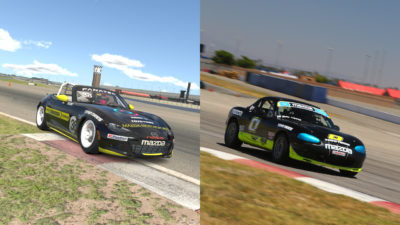In this week two article series, “Building Motorsports Audience Through Esports,” Jim Bowie spoke to why virtual racing will reach new heights. In this segment, we turn to a current Mazda racer and iRacing specialist Mark Polunin to speak to why sim racing is currently being consumed at the rate it is.
In his first racing season in 2021, Mark Polunin won two Spec Miata races and a NASA Teen Mazda Challenge championship. Asked what he attributed his success to, Mark’s reply should not surprise you: “I quickly learned that most of my driving skill developed within sim racing, specifically iRacing.com, was transferable to real life. Heel-toe downshifting, drafting, passing, it all just came naturally like I had turned a thousand laps on track.”
Skillset transfers from virtual to real: Thanks to the advancement of racing software over the years, largely with iRacing – widely believed to be the most real racing simulation software available to the public – a plethora of current in-real life (IRL) race car drivers use iRacing to prepare for an upcoming race. Tracks and cars can be laser scanned for virtual use.
According to Polunin, “Due to the level of sophistication offered in iRacing with the tracks and cars, most IRL racers familiarize themselves with the intricacies of bumps and grip levels in each corner – even braking points – well before ever turning a single, real-life lap. Feedback from simulation hardware like racing wheels and pedals are very accurate, with a little room improvement.”
“For those gearing up for their debut in a real race cars,” Polunin continued, “Sim racing has also helped many learn the basics of racing – learning the racing line; when to brake and when to get onto throttle; how best to carry speed through a corner without getting too much understeer or oversteer; or learn how to save a slide, all from the safety of their home. And, of course, who does not enjoy purposefully drifting a virtual race car? Sim racing is a major time-saver for advancing one’s skillets in a real race car, which should help reduce mistakes and increase productivity and fun during a pricier on-track session in real life.”
iRating: It’s not just the tracks and cars that are sophisticated, iRacing can automatically sort you into races against others with your similar skill level. While the skill ceiling in sim racing is high, iRacing has a rating system called “iRating” that places you in races against people of similar skill levels, enabling competitive races across all levels. iRacing also hosts virtual racing series for IndyCar, IMSA, NASCAR, V8 Supercars, Formula 1, and even Mazda’s own MX-5 Cup car. There’s a car and a series for everyone out there, and one can try out the iRacing experience for 3 months with $5 using code “PR-HOTLAPS”.
Sim racing as a new hobby: While many use iRacing to prep for IRL racing, not everyone wants or can be an IRL race car driver. While there have been many esport competitions online that result in a gamer earning a spot in a real race car, sim racing is a hobby for the majority with a growing community that often is extremely helpful and friendly. Some use sim racing as a casual way to enjoy racing.
International, virtual competitions: Some sim racers will never step into a real race car, but do or will compete against other sim racers and teams on international stages, winning significant prizes and sponsorships. “It seems there is always a big esports competition going on during the last few years with a racer earning prize money or an amazing prize such as a paid contract to be a sim driver for an F1 team,” commented Polunin.
Like real racing and all sports, coaching is available and recommended. Sim racing tends to be more open source than real-life racing. Veteran sim racers often happily upload their lap tutorials and lap analysis videos on YouTube or Twitch. They usually cover popular iRacing series and are extremely detailed with added telemetry and commentary. This makes learning to go faster much easier than being in a scenario where you have to figure out a track all on your own with zero foundation. The magic of simulators is that everything is replicable, including car, track state, and weather; if one has a problem area on a track, a coach can copy those simulator settings and better understand the problem for themselves, and then relate his or her experience of the track and car back to the trainee.
Mark Polunin: Mark’s IRL racing career got off to a great start thanks to his dedication to his craft in iRacing. Naturally, we asked if Mark coaches others and were happy to learn one could connect with him about it on www.markpolunin.com. While online videos and tutorials help, there is an advantage to the extra connection and personal guidance. And for those who have yet to jump into sim racing, Mark offers other simulation consulting services such as setting up the simulator itself.


 ACCESSIBILITY
ACCESSIBILITY